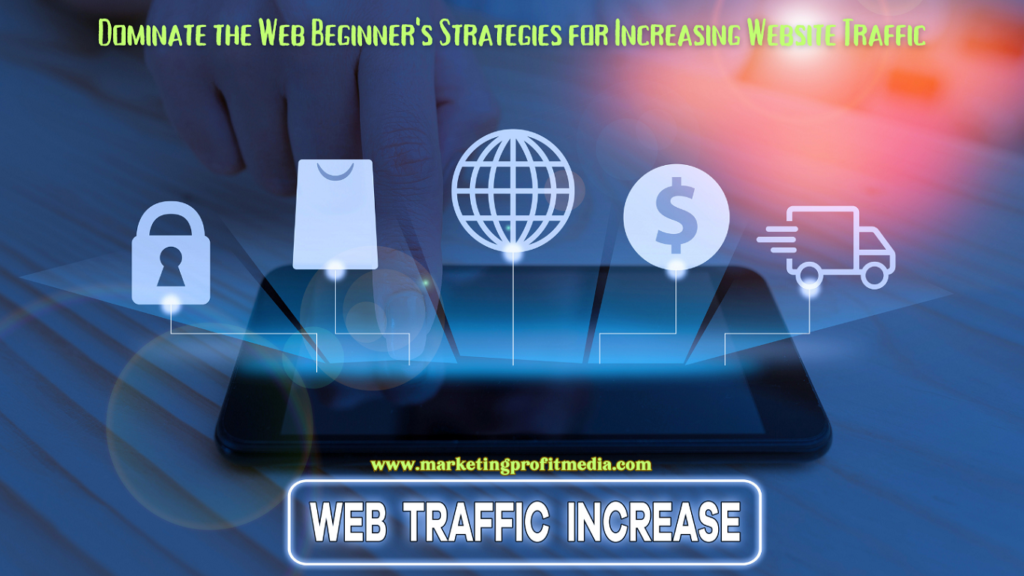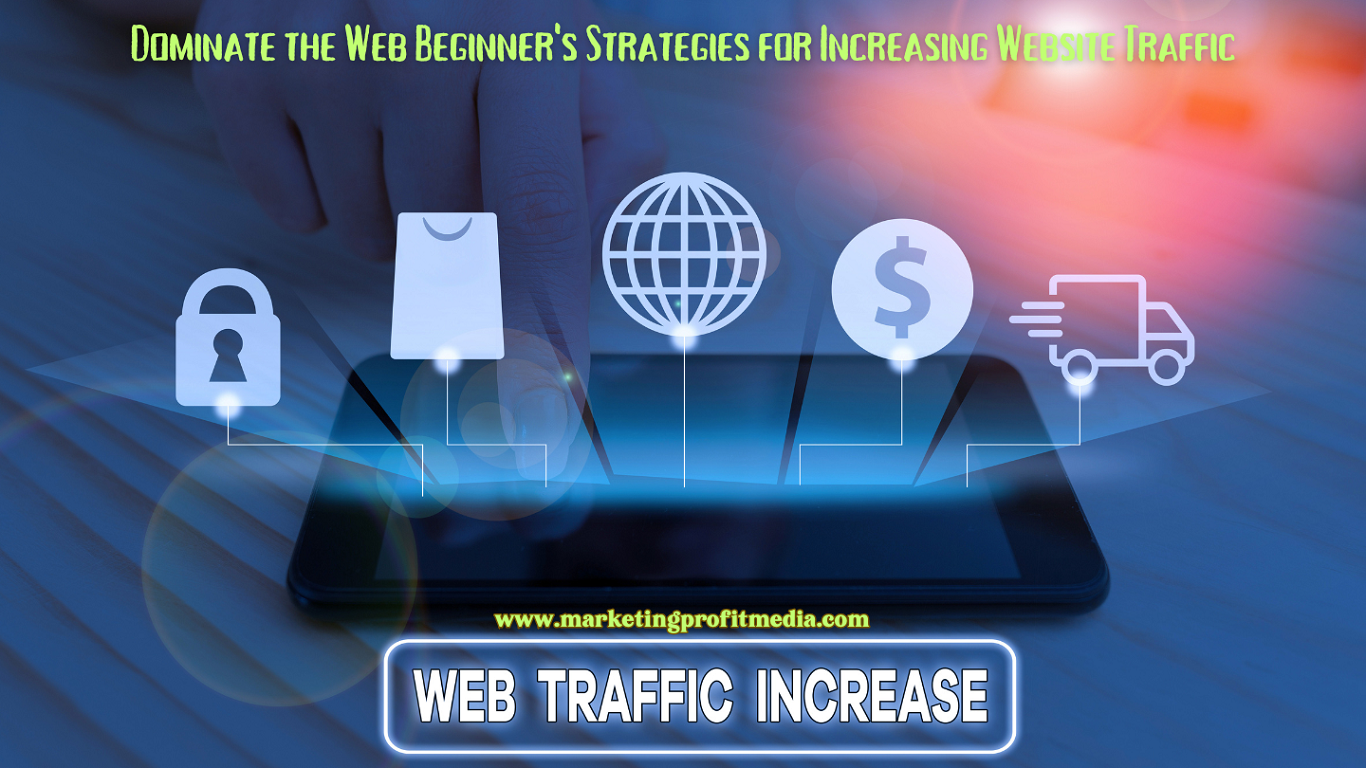Welcome to the digital frontier! In our blog, “Dominate the Web Beginner’s Strategies for Increasing Website Traffic,” we start on a journey tailored for newcomers in the online world. Navigating the complexities of the internet can be daunting, but fear not – this guide is your compass. We’ll unravel the secrets of SEO, delve into content mastery, and explore the dynamic landscape of social media, paid advertising, and more. Buckle up as we equip you with the tools and insights to not just survive but thrive in the vast expanse of the web. Let us go on this exciting journey together!

My Best Recommended & Proven Way to Make $100 Daily – Watch THIS FREE Training to START >>
Definition of Website Traffic
Website traffic is the lifeblood of online success, representing the number of visitors a website attracts. It’s not merely a numerical metric; it signifies the digital pulse of your platform. Understanding the intricacies of website traffic is pivotal for gauging your online presence, engagement levels, and overall effectiveness in reaching and resonating with your target audience.
Importance of Website Traffic for Online Success
The importance of website traffic for online success cannot be overstated. It transcends mere numbers; it’s the conduit to brand visibility, customer engagement, and revenue generation. Robust traffic signifies a thriving online presence, amplifying your brand’s voice and ensuring that your digital footprint resonates with your intended audience.
Understanding SEO
Basics of SEO
Search Engine Optimization (SEO) is the cornerstone of increasing website traffic. It involves optimizing your website to rank higher in search engine results. Learn the basics of SEO, including the importance of meta tags, headers, and proper keyword usage.
Keyword Research
Master the art of keyword research. Identify relevant keywords for your niche and incorporate them strategically into your content. Tools like Google Keyword Planner can assist you in finding keywords with high search volume and low competition.
On-Page SEO Techniques
Implement on-page SEO techniques such as optimizing titles, meta descriptions, and using header tags. This not only makes your content more search engine-friendly but also improves the overall user experience.
Off-Page SEO Strategies
Explore off-page SEO strategies like building quality backlinks, guest posting, and social media sharing. Off-page SEO plays a significant role in establishing your website’s credibility and authority in your industry.
Content is King
Importance of High-Quality Content
Quality content is the backbone of any successful website. Understand the significance of creating content that is not only informative but also engaging and shareable. Invest time in research and present information in a compelling manner.
Creating Engaging and Relevant Content
Learn the art of crafting content that resonates with your target audience. Address their pain points, provide solutions, and encourage interaction through comments and social media shares.
Utilizing Multimedia Content
Diversify your content by incorporating multimedia elements. Use images, infographics, and videos to make your content more visually appealing and shareable. Multimedia content often has a higher chance of going viral.
Social Media Marketing
Leveraging Social Media Platforms
Harness the power of social media platforms to drive traffic to your website. Identify the platforms where your target audience is most active and create a consistent posting schedule.
Engaging with Your Audience
Social media is not just a broadcasting tool; it’s a platform for interaction. Respond promptly to comments, messages, and engage with your audience. Building a community around your brand enhances trust and loyalty.
Sharing Content Effectively on Social Media
Craft compelling social media posts that encourage clicks. Use eye-catching visuals, intriguing captions, and hashtags relevant to your content. Experiment with different posting times to identify when your audience is most active.
Email Marketing
Building and Growing an Email List
Start building an email list from day one. Offer incentives such as exclusive content, discounts, or freebies to encourage visitors to subscribe. An email list is a direct line of communication with your audience.
Crafting Compelling Email Campaigns
Design email campaigns that are not only visually appealing but also provide value. Share updates, new content, and exclusive offers. Personalize your emails to make your audience feel connected to your brand.
Personalization in Email Marketing
Utilize personalization in your email marketing strategy. Address your subscribers by their names, recommend products based on their preferences, and segment your email list for targeted campaigns.
My Best Recommended & Proven Way to Make $100 Daily – Watch THIS FREE Training to START >>
Paid Advertising
Understanding Paid Advertising
While organic methods are crucial, paid advertising can give your website an initial boost. Understand the basics of paid advertising, including pay-per-click (PPC) campaigns, display ads, and social media ads.
Choosing the Right Advertising Platforms
Identify the platforms where your target audience is most active. Whether it’s Google Ads, Facebook Ads, or other platforms, choose the ones that align with your goals and budget.
Creating Effective Ad Copies
Craft compelling ad copies that grab attention and encourage clicks. Use persuasive language, highlight benefits, and include a clear call-to-action. Regularly analyze the performance of your ad campaigns and make adjustments.
Website Optimization
User-Friendly Website Design
Ensure your website is user-friendly with a clean and intuitive design. A well-designed website not only attracts visitors but also keeps them engaged. Optimize navigation and make information easily accessible.
Mobile Optimization
Given the increasing use of mobile devices, optimize your website for mobile users. A mobile-friendly website not only improves user experience but also positively impacts your search engine rankings.
Improving Website Loading Speed
A slow-loading website can turn visitors away. Optimize images, use browser caching, and choose a reliable hosting provider to ensure your website loads quickly. Google considers page speed in its ranking algorithm.
Analytics and Monitoring
Importance of Analytics in Website Traffic
Integrate analytics tools like Google Analytics to monitor your website’s performance. Track key metrics such as traffic sources, bounce rate, and user behavior. Analytics provides valuable insights for making informed decisions.
Utilizing Google Analytics
Learn to navigate Google Analytics and interpret the data. Identify successful strategies and areas for improvement. Regularly check your analytics to stay updated on your website’s performance.
Continuous Monitoring and Adjustments
Website traffic strategies are not set in stone. Continuously monitor your website’s performance and adapt your strategies based on the data. Stay agile in response to changes in the online landscape.
Building Backlinks
Significance of Backlinks
Backlinks are crucial for SEO. They signal to search engines that your website is credible. Focus on acquiring high-quality backlinks from reputable sources within your industry.
White-Hat Link Building Techniques
Adopt white-hat link building techniques such as guest posting, influencer outreach, and creating shareable content. Avoid shortcuts like buying backlinks, as they can harm your website’s reputation.
Avoiding Black-Hat SEO Practices
Steer clear of black-hat SEO practices, such as keyword stuffing, cloaking, and using invisible text. Search engines penalize websites engaging in unethical practices. Focus on sustainable, ethical strategies for long-term success.
Community Engagement
Participating in Online Communities
Join online communities related to your niche. Participate in discussions, answer questions, and establish yourself as an authority. Community engagement not only drives traffic but also builds relationships.
Responding to Comments and Feedback
Encourage comments on your website and respond promptly. Addressing feedback shows that you value your audience’s opinions. Positive engagement fosters a sense of community and encourages repeat visits.
Collaborating with Other Websites
Collaborate with other websites in your industry. Guest post on reputable platforms, participate in joint ventures, and cross-promote with complementary businesses. Building a network enhances your online visibility.
Influencer Marketing
Identifying and Partnering with Influencers
Identify influencers in your niche whose audience aligns with your target demographic. Reach out and explore collaboration opportunities. Influencers can introduce your brand to a broader audience.
Leveraging Influencer Audiences
When working with influencers, leverage their audience by providing valuable content. Ensure that the collaboration feels authentic and resonates with the influencer’s followers. Authenticity is key in influencer marketing.
Measuring Influencer Marketing Success
Establish key performance indicators (KPIs) for influencer marketing campaigns. Track metrics such as website traffic, engagement, and conversions. Assess the success of each collaboration and refine your approach accordingly.
My Best Recommended & Proven Way to Make $100 Daily – Watch THIS FREE Training to START >>
Updating and Repurposing Content
Regularly Updating Website Content
Keep your website content fresh and relevant. Regularly update existing articles with new information, statistics, or insights. This not only benefits your audience but also signals to search engines that your content is current.
Repurposing Content for Different Platforms
Maximize the value of your content by repurposing it for different platforms. Turn blog posts into podcasts, infographics, or video content. Repurposing allows you to reach new audiences and extend the lifespan of your content.
Maximizing the Lifespan of Content
Rather than creating content for short-term gains, focus on evergreen content that remains relevant over time. Evergreen content continues to attract traffic, providing long-term benefits for your website.
Local SEO Strategies
Targeting Local Keywords
If your business serves a local audience, target local keywords. Optimize your content for local search terms and create a Google My Business profile. Local SEO enhances your visibility in local search results.
Optimizing Google My Business
Claim and optimize your Google My Business listing. Ensure accurate business information, including your address, phone number, and business hours. Positive reviews on Google My Business can boost your local SEO.
Encouraging Local Reviews
Encourage satisfied customers to leave reviews on platforms like Google, Yelp, and other relevant sites. Positive reviews build trust and credibility, influencing potential customers in your local area.
Video Marketing
Growing Popularity of Video Content
Video content is gaining immense popularity online. Embrace video marketing to captivate your audience. Platforms like YouTube offer a vast audience for sharing your videos.
Creating Engaging Video Content
Focus on creating engaging and informative videos. Tell a story, showcase your products or services, and provide value to your audience. A well-produced video can go viral, bringing substantial traffic to your website.
Leveraging Video Platforms
Apart from YouTube, explore other video platforms like TikTok, Instagram, and Facebook. Each platform has its unique audience, and diversifying your video content across these platforms expands your reach.
Frequently Asked Questions
Q. How long does it take to see results from SEO efforts?
SEO results vary, but you may start seeing improvements within a few weeks to months. Consistency and ongoing optimization are key for long-term success.
Q. Is paid advertising necessary for increasing website traffic?
While organic methods are valuable, paid advertising can provide a quick boost. It’s essential to find the right balance based on your goals and budget.
Q. What role do analytics play in website traffic strategies?
Analytics help you track the performance of your strategies, identify what works, and make informed decisions to optimize your website for better results.
Q. How often should I update my website content?
Regular updates are beneficial; aim for at least monthly updates. Focus on keeping information current, addressing user needs, and improving overall user experience.
Can influencer marketing work for small businesses?
Yes, influencer marketing can be effective for small businesses. Identify influencers whose audience aligns with your target demographic for the best results.
Conclusion
In conclusion, dominating the web and increasing website traffic is an achievable goal for beginners with the right strategies. By understanding the fundamentals of SEO, creating high-quality content, utilizing social media, and exploring various marketing channels, you can establish a strong online presence. Remember to adapt and evolve your strategies based on analytics and feedback, ensuring sustained growth in website traffic.
My Best Recommended & Proven Way to Make $100 Daily – Watch THIS FREE Training to START >>
Thanks for reading my article on “Dominate the Web Beginner’s Strategies for Increasing Website Traffic“, hope it will help!














